• • • Review: Nouns for Small and Dear
Appositions
English can just chain nouns, where all nouns but the last one serve as adjectives. For instance, a "car engine tuning service" is a kind of a "service".
Croatian cannot do that. Nouns cannot be used as adjectives, but genitive and prepositional phrases must be used:
Servis za podešavanje motora automobila
lit. "service for tuning of engines of cars"
This is illustrated by a bilingual sign for a "dog beach" (dogs are forbidden from most beaches) with a Croatian inscription literally saying "beach for dogs" (I took the photo of a actual sign):
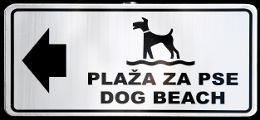
However, there's a construct in Croatian where one noun can describe another, but has a very restricted use. One noun must stand for a member of a group (for instance učitelj "teacher") and another must be a name (Ivan):
Učitelj Ivan "teacher Ivan"
The first noun ('role') can have attributes; both nouns are in the same case:
Moj učitelj Ivan "my teacher Ivan"
Pišem mom učitelju Ivanu. (dat.) "I'm writing to my teacher Ivan."
Order role-name can be reversed, then it means "x, who is y"; again everything is in the same case:
Pišem Ivanu, mom učitelju. (dat.) "I'm writing to Ivan, my teacher."
This is all very similar to English, except for the cases. This construct is not limited to people: as in English, the first noun may be mačka "cat", tvornica "factory", mjësec "moon", and the second the name of a cat, factory or moon.
In English, this does not apply to cities and countries, but Croatian uses the same system as for people, cats and factories, therefore we have:
grad Zagreb "Zagreb city" (lit. "city Zagreb")
Republika Hrvatska "Republic of Croatia" (lit. "Republic Croatia")
Kraljevina Norveška "Kingdom of Norway" (lit. "Kingdom Norway")
Relatives
Let's introduce now words for family members. Croatian has a much more words in this area than e.g. English. For instance, in English, "uncle" can mean either "father's brother", "mother's brother" or "aunt's husband". Croatian is much more precise. Some words don't distinguish sex, but most do:
roditelj mª "parent"
rođak mª "(male) relative" ~ rođakinja f "(female) relative"
brat mª (sg. only) "brother" ~ sestra f "sister"
ujak mª "mother's brother" ~ ujna f "wife of mother's brother"
etc.
This diagram lists relations of a person (represented by a black circle in an oval): younger generations (children) are on the right, older generations (parents) on the left; marriages are represented by blue dotted lines, people directly related to you are shaded yellow. Round rectangles are women, square men:
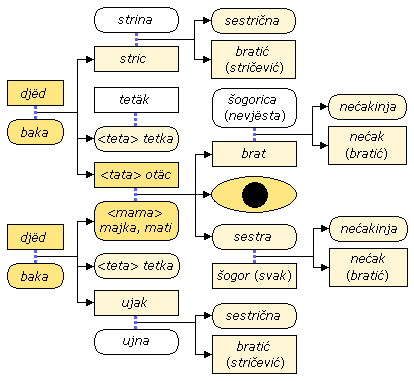
Names in square brackets <...> represent informal words, similar to English "Mom", "Dad". Names in parentheses are somewhat archaic and seldom used nowadays. If you want to talk about great grandmothers (or fathers) you prefix pra-: e.g. prabaka "great grandmother".
If you have children, there are names for them and for their spouses:
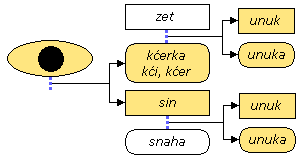
Again, for children of grandchildren, you prefix pre-: praunuk "great grandson".
The following diagram represents additional relations for a married man:
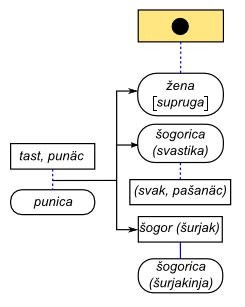
And here are relatives of a married woman:
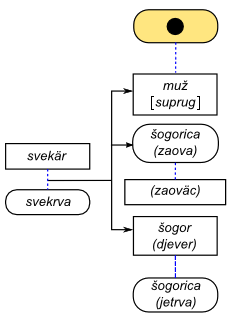
Words in square brackets (e.g. [suprug]) are very formal: you would say suprug only in very formal occasions.
There's a lot of regional variations, but not in the most basic relations. I will explain them later.
Words tata "dad" and mama "mom" are informal words used mostly by children, but adults use them too sometimes. Of course, both are a-nouns:
Tražim tatu. "I'm looking for (my) dad."
Tražim mamu. "I'm looking for (my) mum."
Another very frequent informal word is teta for tetka (similar to "auntie"). As sometimes in English, the informal word for stric (which unfortunately vary by region) and teta are used by children when addressing older non-related men and women.
Roles
This is a suitable moment to meet some words for roles. One group of them are a-nouns with masculine (animate, of course) gender. They are the exception of the approximate rule that all a-nouns are feminine. They common nouns are:
budala mª "fool"
gazda mª "master" (colloq.)
hodža mª "Muslim cleric"
izdajica mª "traitor"
kolega mª "co-worker"
kukavica mª "coward"
lovokradica mª "poacher"
lutalica mª "vagabond"
neznalica mª "know-nothing"
neženja mª "bachelor"
papa mª "pope"
pridošlica mª "newcomer"
propalica mª "low-life"
sluga mª "servant"
skitnica mª "bum, drifter"
šeprtlja mª "bungler"
tata mª "dad"
ubojica mª "murderer"
varalica mª "crook, cheat"
vođa mª "leader"
vojvoda mª "duke"
Some people use such words, when in plural, as feminine. So you might hear:
Kolege je otišao. "The co-worker left." (sg.)
Kolege su otišle. "Co-workers left." (f pl.) (colloquial!)
Kolege su otišli. (the same meaning, m pl.) (Standard)
Such gender-switch is discouraged in Standard, but it's heard often. This kind of 'switch' is purely grammatical — in both examples, kolege are either a group of men or a mixed group (there's another word for a female co-worker, explained a bit below).
There are couple of words derived from vođa by compounding, e.g. vojskovođa mª "warlord", kolovođa mª "ringleader": they behave in the same way.
Other nouns for roles are mostly masculine.
Gender Pairs
Croatian, being quite gender-specific, tries to construct female counterparts of roles, and there are basically four strategies.
First, the already seen suffix -ica is added to the word for the male role. If it ends on -ik or -äc, it's discarded first (učen-ik → učenica, glum-äc → glumica). Common words that follow this pattern are:
blagajnik "cashier"
bogataš "rich man"
car "emperor"
čistač "cleaner"
član "member"
direktor "CEO"
doktor "doctor"
glumäc "actor"
gradonačelnik "mayor"
gledatelj "viewer"
gospodar "master"
igrač "player"
kipar "sculptor"
kolega "co-worker"
kralj "king"
krojač "tailor"
kuhar "cook"
lijëčnik "physician"
odvjëtnik "attorney"
načelnik "village mayor"
pacijent "patient"
pjëvač "singer"
plesač "dancer"
pomoćnik "assistant, aid"
predsjëdnik "president"
pretplatnik "subscriber"
prijatelj "friend"
prodavač "salesman"
profesor "professor"
putnik "traveler"
radnik "worker"
ratnik "warrior"
slikar "painter"
službenik "clerk"
sportaš "sportsman"
staräc "old man"
student "univ. student"
šef "boss"
tajnik "secretary"
učenik "pupil, student"
učitelj "teacher"
umirovljenik "pensioner"
umjëtnik "artist"
vjërnik "believer"
vozač "driver"
zamjënik "deputy"
zastupnik "representative"
zubar "dentist"
Almost all role-words ending on -ač and -nik follow this strategy, exceptions are pjësnik "poet" and vojnik "soldier".
Several a-nouns follow this strategy: kolega → kolegica "female co-worker". In Serbian, a bit strange word koleginica is used instead. Another a-noun does this as well, but irregularly: gazda → gazdarica.
Sometimes derived words have a double meaning: a female role, and additionally some object, e.g. kuharica "female cook", "cookbook"; bilježnica "female notary", "notebook".
The second strategy is to add -ka (again by possibly discarding -äc: policajäc → policajka). This strategy is used by nouns ending on -čar, but by some others as well:
atletičar "athlete (track and field)"
blizanäc "twin" → blizanka
bolničar "nurse"
frizer "hairdresser"
knjižničar "librarian"
novinar "journalist"
matematičar "mathematician"
penzioner "pensioner" (colloq.)
policajäc "policeman" → policajka
političar "politician"
premijer "prime-minister"
veterinar "vet"
Names for inhabitants ending on -nin (recall, that -in is lost in plural) also add -ka, discaring -in:
državljanin → državljanka "citizen (of a country)"
građanin → građanka "citizen (city dweller)"
Zagrepčanin → Zagrepčanka "citizen of Zagreb"
The second strategy is more common in Serbian, where it's used by almost all role words ending on -r (doktorka, profesorka, slikarka, zubarka... but kuvarica). This is yet another subtle difference.
The third strategy is to add -inja (to words ending on -k) or -kinja, again by discarding suffixes:
imenjak → imenjakinja "namesake"
pjësnik → pjësnikinja "poet"
prvak → prvakinja "champion"
rođak → rođakinja "relative"
sudäc → sutkinja "judge"
trgoväc → trgovkinja "merchant, shop-keeper"
The fourth strategy is to simply add an -a; there are only few common words that use it (beside the already mentioned unuk):
kum "godfather" → kuma "godmother"
suprug "spouse, husband" (formal) → supruga "spouse, wife" (formal)
susjëd "neighbor" → susjëda
However, for most roles ending on -äc, there's no easy way to make a female role noun! There's no strategy at all. One would expect discarding the ending and substituting -ica, as in glumäc and staräc, but for some strange reasons it's not always so:
boräc → (no pair) "fighter, activist"
kupäc → (no pair) "buyer, shopper"
kriväc → (no pair) "culprit, perpetrator"
loväc → (no pair) "hunter"
pisäc → spisateljica (!) "writer"
Some people don't like it (for ideological reasons) and propose words (like kupkinja) that nobody uses; in reality, masculine role-words can be applied to women. Recall that there's only one word for "parent" (roditelj, only mª) or "person" (osoba, only f), and no one objects to that. It's just so that Croatian uses preferably masculine nouns for various roles.
Many words for roles of type ubojica, izdajica (that is, having mª gender) can be used for females as well — there are no separate feminine counterparts. When they stand for a female, they are considered as having f gender:
Ubojica je došäo. (mª)
Ubojica je došla. (f)
Croatian is everything but gender-neutral: zrak "air" is masculine inanimate; voda "water", vatra "fire" and zemlja "earth, ground" are feminine. Život "life" is masculine inanimate, and smrt "death" feminine!
Updated 2014-11-07 (ver 0.4)
2 comments:
Whan are the children of my son called?
... and the children of my brother?
Post a Comment